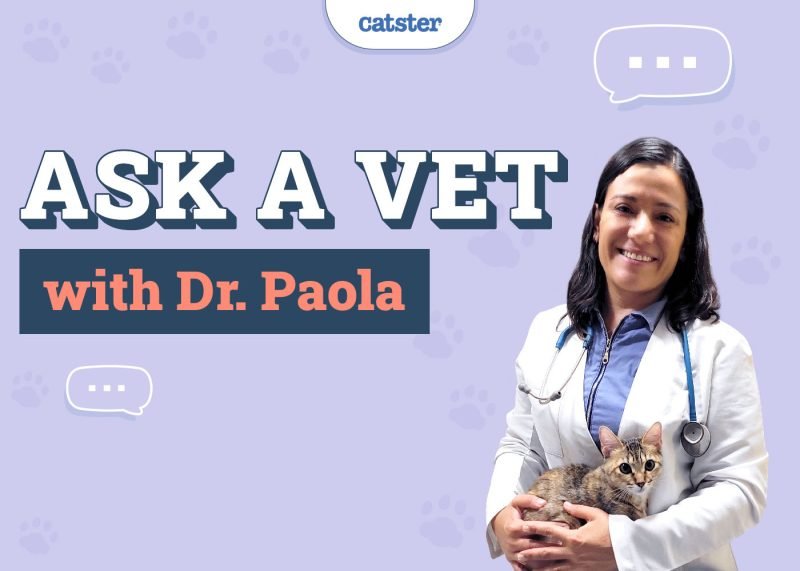Welcome to our “Ask Dr. Paola” series, where every Monday we bring expert advice from Dr. Paola Cuevas (MVZ) to help our readers understand the health and well -being of their cats.
Whether you are a new pet parent or an experienced cat lover, Dr. Paola here to give answers to your most pressing questions. From nutritional tips and preventative care to troubleshooting ordinary behavioral questions is Dr. Paola ready to offer insight that will keep your kitty happy, healthy and cats fine. Keep an eye on expert guidance on a variety of topics that matter most to you and your cat so you can make informed decisions and give the best possible care to your furry companion.
Do you have a question? Send it in here!

Help! My cat is always rubbing!
“Dear Dr. Paola,
Why is my cat rubbing, always on me right after my other cat, Louis, rubbing me? “– Bri
Hi Bri,
What you notice is a perfectly normal and quite charming part of the cat communication. Cats have fragrance glands on their cheeks, chin and forehead, and when they rub against you, they leave the pheromones that mark confidentiality and belonging. If Louis rubs on you first, he is essentially “including” you in his scent profile. When Blue follows and rubs you, he not only responds to Louis’s scent, but actively adds his own, creating a shared group scent.
In households with several cats where cats are well tied, this mixed scent acts as an invisible signature that says, “We are family.” It helps reduce stress, strengthen social ties and maintain group harmony. Blue’s behavior is his way of ensuring that he is part of the shared identity, and it is actually a sign of comfort and connection rather than rivalry. By “re -branding” you after Louis, Blue simply weaves his scent into the family’s imagery, a gentle reminder that you all belong together.
Sincerely
Dr. Paola

If you would like to talk to a veterinarian, like Dr. Paola or one of our other expert veterinarians, you can go over to Pangovet. It’s our online service where you can Talk to a veterinarian online And get the advice you need for your cat – all at an affordable price!
Catster Reader Exclusive Deal: Save 65% on your first call, use code Askdrpcatster65 At the box.


Help! My cat has been diagnosed with heart failure!
“My cat chicken (an 11-year-old castrated man) has been diagnosed with heart failure. The vet took 170 ml of fluid from his chest and gave us a diuretic to give him twice a day. What else can we do? Know said his condition will worsen.” – Felizitas
Felizitas,
I’m sorry you and chick are going through this. In cats, heart failure often leads to fluid accumulation around the lungs (pleural effusion) or inside them (pulmonary edema), making breathing more difficult. The fluid removal that your veterinarian performed is called thoracentesis, and the diuretic helps the body to reduce further structure. Unfortunately, as your veterinarian explained, heart failure is a progressive state, but there are ways to keep the chicken comfortable and potentially slow down its progression.
In addition to giving the prescribed medication exactly as stated, regular follow -up visits are essential so that your veterinarian can monitor Chick’s heart function, adjust the diuretic dose and control for any electrolyt tubs or effects on the kidneys. Depending on the underlying cause of his heart failure, your veterinarian may recommend medication such as ACE inhibitors, pimobendan or others to support heart function. At home, keeping your environment calm down, avoiding stress or excessive effort and monitoring his dormant respiratory rate help you catch changes early. If you notice that his rest speed is consistently over 30 breathing per day. Minute, or if he works harder to breathe, it is an urgent situation that needs immediate veterinary attention.
While the prospects of heart failure are protected (which means the result is unpredictable), attention care, frequent reassessments and rapid response to changes can help maintain chicken comfort and quality of life as long as possible.
Best wishes,
– Dr. Paola

Help! My cat goes into a trance!
“Hi Dr. Paola,
When I scrape my cat on her chest, she opens her mouth and walks in a strange trance, and it’s as if her eyes are rolling back in her head with joy. It’s crazy! She seems to enjoy it, but it’s also a bit crazy to see. I was just wondering if it was normal (or at least okay) for me to keep scratching her there! Cats are so funny. Thank you, Dr. Paola! “ – Hallie
Hi Hallie,
What you describe is actually quite ordinary and in most cases perfectly harmless. Cats have a high concentration of sensitive nerve endings in certain “sweet spots” like the chest, chin, cheeks and tail base. As you scrape her breast, you can stimulate a cluster of sensory nerves that sends strong comfortable signals to her brain. The “trance-like” state, with a casual jaw and half closed or rolled eyes, is essentially her who slides into deep joy, a bit like a person who zones out during a large massage.
As long as she starts or leans into contact and shows no signs of discomfort or agitation afterwards, it is safe to continue. Just keep an eye on her body language if the sensation ever switches from joy to excessive stimulation. Overstimulation happens when too much to clap causes a cat’s nerves to become too sensitive, which can quickly change their joy to irritation. This funny, blissed reaction is one of the many ways cats show how deep they can enjoy gently, trusted touch from their favorite people, although it is always wise to remain aware of their signals.
Best,
Dr. Paola
- Read the last weeks questions here – August 18, 2025
- Find the full list of previous articles here
- Click here to submit a question
